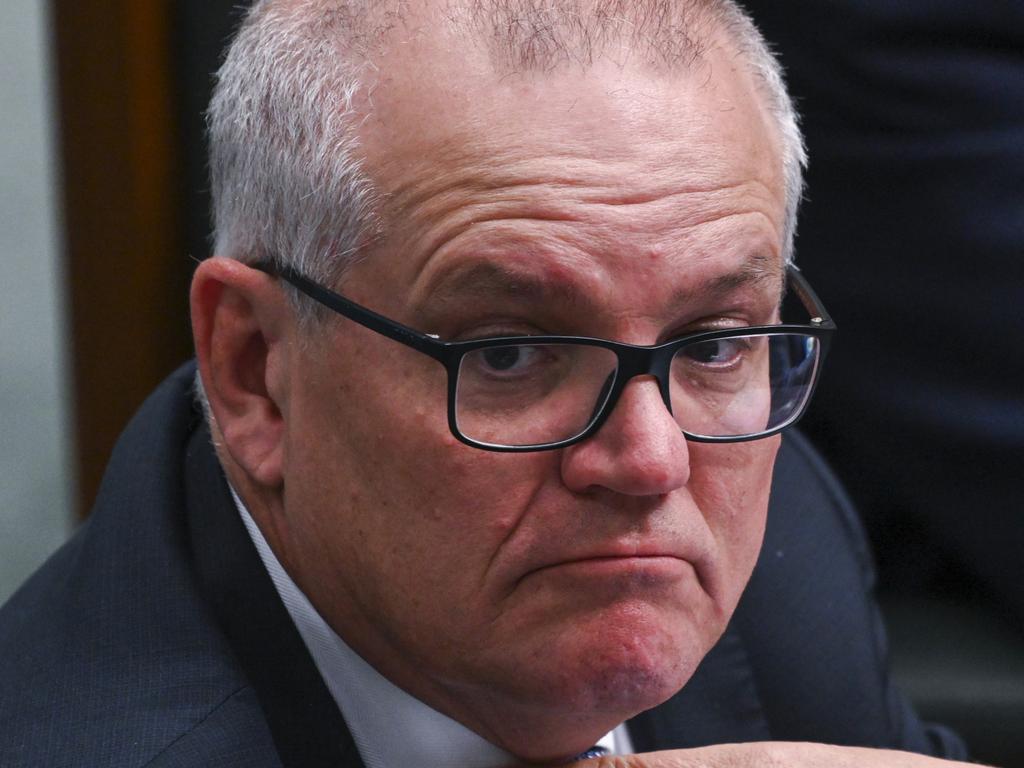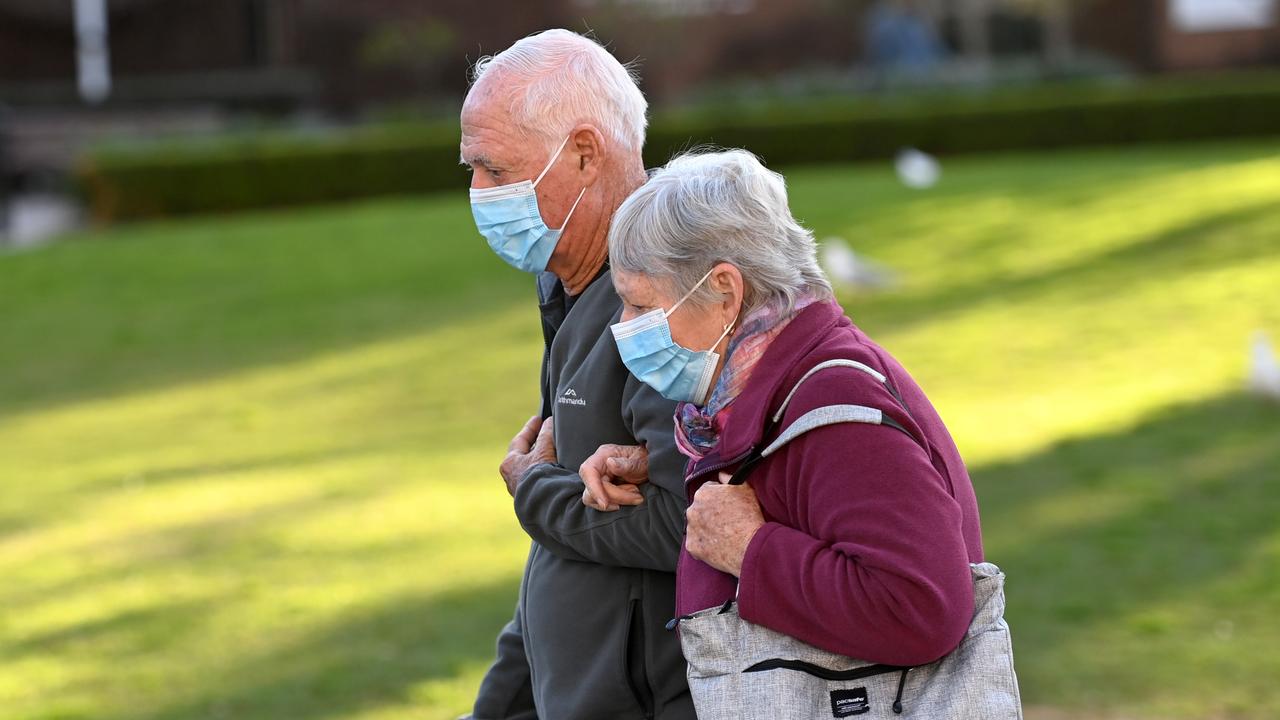Qld and Vic Premiers defend decisions after damning review of Australia’s Covid-19 response
Daniel Andrews and Annastacia Palaszczuk have pushed back against a damning review into Australia’s Covid-19 response.

The Premiers of Victoria and Queensland have pushed back against an independent review of Australia’s response to Covid-19 which found “significant mistakes were made”.
Daniel Andrews and Annastacia Palaszczuk both defended the decisions made by their governments during the pandemic after the 97-page Fault Lines review was released on Thursday.
The review found state and federal governments “overreached” with politically driven health orders and excessive lockdowns which failed to protect the elderly, disregarded the young and abandoned disadvantaged communities.
Mr Andrews said he was yet to read the report, which he dismissed as “academic views”.
“There was nothing academic about the fact that we had to have lockdowns because we didn’t have any vaccine,” he said.
“There was nothing academic about doing everything we could, very difficult decisions with real impact, to save lives.”
Mr Andrews, who oversaw some of the harshest Covid measures in Australia, including 262 cumulative days of lockdowns in Melbourne, said “there are many things we wish we didn’t do – many decisions we wish we didn’t make’’.
“That’s why I say that these decisions were not made lightly and they were the subject of debate and discussion and very careful consideration,’’ he said.
“And the challenge is to weigh up those consequences versus having death rates like they did in Italy, like they did in the United States, like they did in the United Kingdom.”

Ms Palaszczuk stood by her strict border closures, saying she had made decisions “in the best interest of Queenslanders”.
“I think the pandemic has had long term impacts on a wide range of people, not just because of border closures,” she said.
“I stand by the decisions that the chief health officer made at the time that I backed in.
“I stand by our world leading result when it comes to the number of lives lost compared to other jurisdictions and what happened around the world.”
Western Sydney University chancellor Peter Shergold, a former top public servant who led the review panel, said vulnerable communities were hit hardest by governments’ responses to Covid.
“I think the single biggest failure was not sufficiently planning for the fault lines in society,” Mr Shergold told reporters on Thursday after the report was released.
“Those who are disadvantaged, those who are vulnerable.”
The report said “for many of us, the story of Covid-19 will be one of inconvenience” while for others it would have been one of trauma and isolation.
“It will be a story of being locked in overcrowded housing, job loss and missing out on government supports.
“It will be a story of more domestic violence, increased alcohol abuse, deteriorating mental and physical health.”

Mr Shergold told reporters governments would have known that older Australians, migrants, women, Indigenous people and those from low-socio economic communities would be more harshly affected by Covid policies.
He called on state governments and the Commonwealth to consider the report’s recommendations, which include ensuring the most vulnerable are at the centre of future health crisis planning.
The review panel, made up of Mr Shergold, Jillian Broadbent, Isobel Marshall and Peter Varghese, acknowledged government decisions had been made under a “fog of uncertainty”.

Mr Shergold said the purpose of the review was not to lay blame on anyone but to ensure mistakes were not made twice.
“In a real sense, we are all responsible,” he said.
“I cannot say to you with my hand on my heart that two years ago in that swirling fog of uncertainty I would have made different decisions or given different advice.
“The key is that we’ve learned the lesson for the next time or even for the rest of this pandemic.”
As for lockdowns, including that which divided Sydney between east and west, Mr Shergold said the policy was an effective way of containing an outbreak.
“But the danger of doing that is it can undermine public trust when people in Bankstown think they’re being unfairly treated compared with people in Bondi,” he said.
Anthony Albanese said the review was a “serious” piece of work which would inform any inquiry into the pandemic response undertaken by the federal government.
“I have said clearly that my government will undertake at some future time a proper inquiry into the impact of the pandemic, the actions of governments,” the Prime Minister told reporters on Thursday.
“We need to learn the lessons from the pandemic.
“I have not had the opportunity to read all of the report, but I certainly intend to.”


The review highlights four key areas in which the government should have done better.
1. Economic supports should have been provided fairly and equitably
“Rules were too often formulated and enforced in ways that lacked fairness and compassion,” the panel said.
“Such overreach undermined public trust and confidence in the institutions that are vital to effective crisis response.”
The review also pointed to the unfair effect of lockdowns on children and parents, particularly mothers.
“For children and parents (particularly women), we failed to get the balance right between protecting health and imposing long-term costs on education, mental health, the economy and workforce outcomes,” the panel said.

2. Lockdowns and border closures should have been used less
The review found lockdowns and border closures should have been a “last resort” and suggested they would have not been necessary if policy didn’t fail in other areas.
“Too many of Australia’s lockdowns and border closures were the result of policy failures,” the panel said.
Mr Shergold said lockdowns should be used to “buy time” to purchase vaccines and PPE, prepare hospitals and ICU departments and nail down contact tracing and quarantine procedures.
The review also found that politics contributed to unnecessary lockdowns.
“Politics also played a role. Localised outbreaks were inevitable. Statewide and nationwide outbreaks were not,” the panel said.
3. Schools should have stayed open
“It was wrong to close entire school systems, particularly once new information indicated that schools were not high-transmission environments,” the panel said.
Mr Shergold said Australians now knew that shutting down schools came with significant costs.
“It’s not just educational disruption or the impact on the economy because parents have to stay home or the increased pressure on parents and particularly I’d have to say mums,” he said.
Women were found to have borne the brunt of childminding responsibilities when schools closed, taking up an extra four hours of unpaid domestic work per day.
This made women 30 per cent more likely than men to leave the workforce in the first months of the pandemic.
“We can already see it in terms of the stress and the anxiety and the frankly mental ill health of many young people who have not just been shut-out of school but shut-out of normal life,” Mr Shergold said.
4. Older Australians should have been better protected
The review suggests that the government should have paid more attention to elderly Australians given the pre-existing problems in aged care.
“Funding was inadequate. The labour force was stretched. Fixing aged care requires changed attitudes,” the panel said.

The review said restricting aged care residents from going to hospital when they contracted Covid was a “mistake that cost lives”, while restrictions on aged care visits past the worst of the pandemic were said to have caused “unnecessary pain and distress”.
Two hundred health experts, public servants, epidemiologists, unions, community groups, businesses and economists were consulted to formulate the review and 3000 hours were put into research, policy and data analysis.
The review panel made six recommendations for future health crises.
1 Establish an independent, data-driven Australian Centre for Disease Control and Prevention
2 Clearly define national cabinet roles and responsibilities in a crisis
3 Publicly release modelling used in government decision making
4 Regular pandemic scenario testing
5 Sharing and linking of data between jurisdictions
6 Establish an Office of the Evaluator General for real-time tracking of policy performance during a crisis

Other areas of concern included the enormous amount of government debt racked up during the pandemic, with the review suggesting it will take 20 years to return debt to pre-pandemic levels.
“Federal government net debt has risen from 19 per cent of GDP in 2019 to 28 per cent of GDP in 2022,” the panel said.
Total debt across the states and territories is almost four times as high as it was in 2019.
“Governments will need to decide who should bear the cost of budget repair and how much of it will fall on young people,” it said.
The panel criticised the government’s failure to include a clawback mechanism for businesses supported by JobKeeper, calling it “a design fault”.
“It was fiscally irresponsible and unfair when other groups in society were excluded from economic supports,” the panel said.
The panel also blamed the exclusion of short-term casual and temporary migrant workers from JobKeeper for the current labour shortage crisis.
The review was funded by the Paul Ramsay Foundation, John and Myriam Wylie Foundation and Andrew Forrest’s Minderoo Foundation.



